Arguing with someone who has ADHD can be quite challenging, particularly if you lack a thorough understanding of the nuances of the condition. Attention Deficit Hyperactivity Disorder (ADHD) is a neurological condition that makes it hard for a person to focus, control their impulses, and manage their emotions. When these features come up during an argument, both people can get angry. People with ADHD may get quickly sidetracked, talk without thinking, or have trouble remaining on topic, which makes it hard to come to an agreement in an argument.
It’s important to remember that someone with ADHD isn’t trying to be difficult. Even though their reactions are often very strong, they are usually based on how their brains are wired. They might feel things more strongly, have trouble focusing, and even have trouble controlling their actions at times. But the first step to better communication and handling disputes is to understand these patterns. We’ll talk about how to handle fights with someone who has ADHD in this article, and we’ll provide you some useful tips for enhancing communication and resolving conflicts.
The Challenges of Arguing with Someone Who Has ADHD
To learn how to argue with someone who has ADHD, the first step is to know what problems they have. Attention problems, impulsivity, and trouble controlling emotions are some of the most frequent symptoms of ADHD that can get in the way of disputes.
-
Inattention: One of the hallmark symptoms of ADHD is difficulty maintaining focus. During an argument, this might translate into someone drifting off-topic or forgetting key points. This can be frustrating for the other person, as it may seem like the individual with ADHD isn’t paying attention or doesn’t care about the conversation. In reality, they may simply have trouble keeping their thoughts organized and staying engaged with the discussion.
-
Impulsivity: Another defining trait of ADHD is impulsivity. This can show up in arguments as interruptions, speaking out of turn, or saying things without thinking them through. People with ADHD often act on impulse, which can lead to more heated exchanges or comments that are hurtful or irrational. These impulsive responses aren’t intended to hurt anyone, but they can create additional tension in an argument.
-
Emotional Dysregulation: Individuals with ADHD often experience intense emotional reactions, which can make arguments feel more charged than they otherwise would be. They might become overly frustrated, angry, or upset, even when the issue at hand isn’t that significant. The emotional intensity can make it difficult to calm down or move past a disagreement.

How to Deal with Someone with ADHD?
When you’re arguing with someone who has ADHD, it’s easy to become frustrated or feel like communication is breaking down. But there are a few methods you can take to make the conversation more productive and deal with differences in a better way.
- Be Clear and Direct: People with ADHD often struggle with distractions and may have difficulty processing complex or long-winded arguments. To make your point clear, try to be direct and concise. Stick to one issue at a time, and avoid bringing up past grievances or unrelated topics. Keeping your language simple and straightforward can help the person with ADHD stay focused and better understand your perspective.
-
Practice Active Listening: Active listening is an important skill in any conversation, but it’s especially crucial when arguing with someone who has ADHD. It’s easy for individuals with ADHD to feel like they’re not being heard, which can escalate their emotional reactions. By practicing active listening, you demonstrate that you value their input and are willing to hear their side of the story. This can help de-escalate the situation and promote a more cooperative dialogue.
-
Give Them Space to Process: People with ADHD often need extra time to process information or calm down after an emotional exchange. If you notice that the person is becoming overwhelmed or shutting down, it might be helpful to take a break from the argument. This can give both parties a chance to collect their thoughts and approach the discussion with a clearer mindset.
-
Stay Calm and Patient: ADHD can make someone more reactive to stress, so it’s important to stay calm and composed during the argument. If you raise your voice or become frustrated, it can escalate the situation and make it harder for the person to regulate their emotions. Practice patience and try to maintain a non-confrontational tone, even if the conversation is difficult.
-
Offer Constructive Solutions: Rather than simply highlighting the problem, try to propose solutions during the discussion. People with ADHD often feel more empowered and engaged when they can work together to resolve an issue. For example, if the argument is about an uncompleted task, you could offer to break it down into smaller, more manageable steps. Offering practical solutions shows that you’re invested in finding a resolution, rather than just venting frustrations.
-
Set Boundaries: ADHD can make it difficult to respect personal boundaries, especially when emotions are running high. It’s important to set clear boundaries during the argument, especially if the other person is interrupting or speaking over you. Politely ask for space to express yourself and encourage them to do the same. Establishing boundaries helps maintain respect and keeps the conversation more focused.
Related Article: ADHD in Adulthood
Creating a Productive Environment for Arguing with Someone Who Has ADHD
Where you have a fight can have a big effect on the result, especially if the other person has ADHD. A peaceful place with no distractions is the best place to have a productive chat. If you can, pick a moment when neither of you is busy or stressed with other things. A peaceful, neutral environment can help people stop acting on impulse and let both sides focus on fixing the problem at hand.
It’s also crucial to remember that people with ADHD may be more sensitive to criticism, especially if it is harsh or critical. Try not to blame or accuse them, since this can make them defensive or cause them to have emotional outbursts. Instead, use “I” words to say how you feel without blaming the other person. Instead of saying, “You never listen to me,” you should add, “I feel frustrated when I don’t feel heard during our conversations.”
Related Article: ADHD Lifestyle Changes
Conclusion: How to Handle Arguments with Patience and Understanding?
It can be hard to argue with someone who has ADHD, but it doesn’t have to be frustrating. You can be more tolerant and patient if you know what makes them act the way they do, including being inattentive, acting on impulse, or having trouble controlling their emotions. Remember that clear communication, active listening, and giving suggestions can help calm things down and make discussions more useful.
When you argue with someone who has ADHD, the most important thing to remember is that their reactions are usually not meant to hurt you on purpose. You may settle disagreements in a way that helps both sides and makes your relationship stronger by making the space courteous, peaceful, and focused on finding a solution. So, the next time you dispute with someone who has ADHD, try to be kind and patient.
